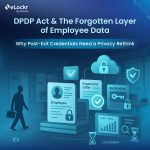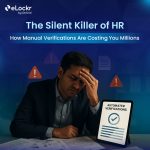The rise of remote work has transformed business operations, replacing traditional office structures with flexible, location-independent setups. However, this shift brings new challenges, especially around trust, verification, and credential management. How can organizations ensure their remote employees truly possess the skills, experience, and qualifications they claim? This is where verifiable credentials come in – revolutionizing the way education and employment details are verified in the age of remote work.
Why Verifiable Credentials Are the Future
The days of relying solely on physical documents for verification are rapidly fading. Traditional methods of verifying a candidate’s background—whether educational qualifications or previous employment—are often slow, labor-intensive, and prone to errors due to the involvement of third parties. They require numerous calls, emails, and extensive paperwork, leading to delays in the hiring process and increasing the risk of errors or miscommunication.
Verifiable credentials are a game-changer—secure, tamper-proof, and instantly verifiable. They enable fast, confident hiring, especially in today’s fast-paced environment. This is crucial for remote teams, where limited physical interaction makes efficient digital processes essential.
Streamlining Education Verification
One of the key challenges in hiring remote employees is verifying that candidates have the qualifications they claim. As the number of offline courses and new certifications continues to grow, it becomes increasingly difficult to confirm their authenticity. Traditional methods of verifying educational backgrounds can take days or even weeks, leading to delays and bottlenecks in the recruitment process.
With verifiable credentials, this verification process becomes almost instantaneous. Platforms like eLockr allow education institutes to issue digital degrees and certificates in the form of credentials that employers can easily verify. There’s no need for back-and-forth communication with universities or colleges, no waiting on mailed transcripts, and no uncertainty about whether the credentials are real or forged. For remote employers, this is a huge win, enabling faster onboarding and ensuring that every hire is as qualified as they say they are.
Empowering Ex-Employee Credentials
The value of digital credentials doesn’t stop at education. Ex-Employment Credentials are just as important when building trust in a remote workforce. In a traditional office setup, previous employment is often verified through phone calls or emails with past employers—a process that can take significant time and may not always yield accurate results.
With verifiable credentials, organizations can issue verifiable experience certificates that are both secure and instantly accessible. Ex-employees can share their credentials with future employers, eliminating the need for HR departments to repeatedly verify employment histories. This not only saves time for the hiring company but also creates a smoother, more trustworthy process for the employee.
Platforms like eLockr go even further by providing an automated system for ex-employee verification. Employers no longer have to manually respond to verification requests, as the platform handles everything securely and efficiently. The platform also offers anonymous ex-employee surveys to gather feedback and insights on employee experiences—information that can be invaluable for improving internal processes and reducing future attrition.
Key Benefits of Verifiable Credentials for Remote Work
As remote work becomes the norm, ensuring a smooth and secure hiring process is more critical than ever. Verifiable credentials offer a powerful solution, enabling companies to streamline verification, enhance trust, and operate more efficiently in a global workforce. Here are some key benefits of using digital credentials for remote work:
- Speed and Efficiency
Imagine hiring a remote candidate from across the globe in a fraction of the time. Verifiable credentials cut down the time-consuming steps in the verification process. Whether you’re verifying degrees or past employment, everything is available instantly and securely online. - Trust and Fraud Prevention
The authenticity of verifiable credentials is guaranteed. Unlike physical documents, which can be tampered with or falsified, digital certificates are tamper-proof and verifiable directly from the source. This level of trust is crucial when hiring employees who may be working from a different city—or even a different country. - Seamless Ex-Employee Verification
Digital platforms make verifying an ex-employee’s work history fast and easy. HR departments no longer have to field calls or respond to emails about past employees. Instead, a digital credential serves as a self-verifying proof of employment. - Attrition Insights
For companies managing large remote teams, platforms like eLockr offer attrition insights with data on where ex-employees are moving and trends in departures, organizations can take proactive steps to improve retention and identify potential issues before they escalate. - Process Automation
By automating the verification process, eLockr reduces manual workloads, freeing up HR professionals to focus on more strategic tasks. - Data Security and Compliance
Privacy concerns are top-of-mind for any business, especially those operating remotely. Digital credential platforms provide a highly secure environment, ensuring that only authorized individuals have access to sensitive information. These platforms are built with compliance in mind, offering peace of mind when it comes to handling employee data.
Conclusion
As the workforce continues to evolve, verifiable credentials are becoming an essential tool for building remote teams. They streamline the process of verifying education and employment details, enhance security, and offer valuable insights into workforce trends. With eLockr, businesses can not only improve their hiring processes but also empower their employees with verifiable records that support their career growth.
The future of work is digital—are you ready to embrace it?





Leave a Reply